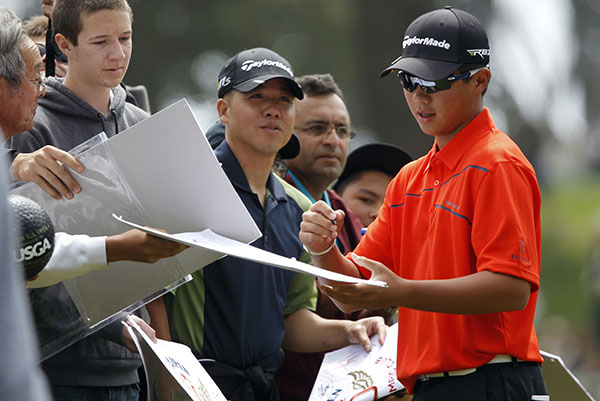Stanford freshman Emily Wang Ziyi had a high SAT score, was a student union president and enjoyed reading, writing, calligraphy, music and jogging. But what really helped the 18-year-old get into the elite US university was something rarer: her potential to be an international golf star.
"Emily is the epitome of a student-athlete," said Stanford golf head coach Anne Walker. "She has pursued an extremely rigorous academic schedule in Beijing and, at the same time, traveled internationally to compete in the best golf events."
Many Chinese families with children who golf were also overjoyed at Stanford's decision, but for a more practical reason. For them, a golf scholarship from such a prestigious US university was another testimonial affirming a unique strategy of college preparation that centers on the game as a scholarship vehicle.
In the past few years, dozens of Chinese students have played golf on US sports scholarships that were won after years of hard training and with considerable parental investment in money and time.
The trend has accelerated since 2015, and there is now a bigger crop ripe for the picking, with almost 20 students from the Chinese mainland signing with golf programs at universities including Stanford, Princeton, University of Southern California, University of Washington and University of California, Berkeley, according to American Junior Golf Association, which tracks students' commitments to college offers.
While Wang is the youngest ever to win the China LPGA Tour, several others have the same, if not more illustrious, golf resumes, despite their youthfulness.
They include University of Florida freshman Andy Zhang, who, at the age of 14, was the youngest golfer ever to compete in the US Open.

China's Andy Zhang signs autographs at the fourth tee during a practice round for the 2012 US Open golf tournament on the Lake Course at the Olympic Club in San Francisco, California. He is now a freshman at the University of Florida.
Beijing native Jin Cheng, 18th in the World Amateur Golf Ranking, is a USC freshman.
He Muni, who was born in Chengdu, is known for amateur appearances at pro events and top junior finishes. She will compete on the USC women's team in the spring.
Most of the teens learned the game at a young age, with their fathers as their first teacher. And all have come from upper-middle-class families, since training and competition are expensive.
Wang's mother, Liu Yan, who advocates golf as a steppingstone to US universities, said she had devoted all her time to her daughter as her cook, driver and chaperon. Her father trained with her during weekends and took leave to be her caddie at important competitions.
However, Liu said she believed that extraordinary self-discipline was the key to her daughter's success.
Likewise, Dan Webb, CEO of Palm Springs Golf, an academy for local children in southern Shenzhen, said he believed young Chinese golfers' greatest advantage is their way of thinking.
"The Chinese philosophy produces an extreme work ethic, focus and humility," he said. "When circumstance allows self-confidence to be introduced within this philosophy, you have the making of a serious golf player, perhaps a champion."
Luo Ying caused a stir in Seattle in 2013 when she played for the University of Washington while maintaining a 4.0 grade point average. It was fun playing the sport she loves and get-ting paid for it, she told a recent gathering of Chinese parents and children who were eager to follow her path.















